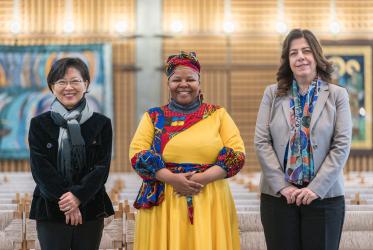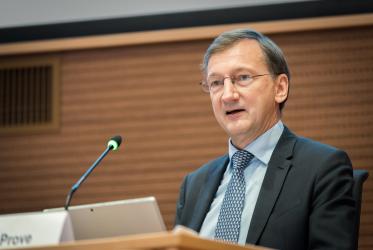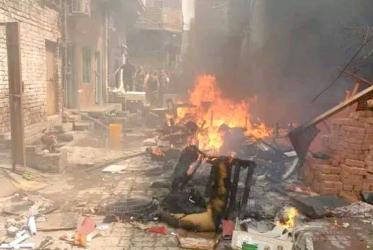17-19 September, 2012
Geneva, Switzerland
Communiqué
1. We believe that the role of religion is to create a climate of peace, stability, tolerance, reconciliation and respect for human dignity and the human rights of all people and not to promote conditions that create intolerance and hatred. The core values of all religions teach values of justice, peace, reconciliation, equality and human dignity. The adherents and leaders of all religions have the moral responsibility to promote and protect peace with justice and human dignity.
2. The international hearing on the “Misuse of the Blasphemy Law and Rights of Religious Minorities in Pakistan”, organized by the Commission of the Churches on International Affairs (CCIA) of the World Council of Churches (WCC) from 17 to 19 September 2012, was attended by about 100 participants from Africa, Asia, Europe and North America, including 23 representatives of Christian, Muslim and Hindu religious groups and civil society and human rights organizations from different parts of Pakistan. The hearing provided opportunities for participants to listen, analyse and understand the complex situation of the rise of religious fundamentalism and extremism and the misuse of the Blasphemy Law in Pakistan which leads to blatant violations of human rights.
3. Recalling the assurances given to the religious minorities by Mohammed Ali Jinnah, the father of the nation, that “all citizens are equal regardless of belief”, and Article 18 of the Universal Declaration of Human Rights and the International Covenant on Civil and Political Rights, “Everyone shall have the right to freedom of thought, conscience and religion”, we, the participants of the international hearing, express great concern and regret that the minority religious communities in Pakistan today have become a target of discrimination and attacks and are facing violations of fundamental human rights. While we recognize that in many communities Muslims and minority religions live in harmony, the Blasphemy Law nevertheless has become a source of victimization and persecution of religious minorities in Pakistan.
4. During our three days of deliberations at the hearing – plenary presentations, panel discussion at a side event during the 21st session of the United Nation’s Human Rights Council, open hearing and workshop sessions - we heard examples of the alarming trend of misuse of the Blasphemy Law and its impacts. Article 20 of the Constitution of Pakistan guarantees freedom of religion as a fundamental right stating that “every citizen shall have the right to profess, practise and propagate his religion” and article 36 stipulates the protection of minorities in that “the State shall safeguard the legitimate rights and interests of minorities”.
However, these constitutional guarantees are being negated. Pakistan society has been experiencing militarization and politicization of religion, which has led to abuse of religion for political gains, which in turn results in violations of fundamental human rights of minority religions in Pakistan. Religious minorities in the country have been living in a state of fear and terror as the Blasphemy Law has been used to register false cases against religious minorities. The increasing trend of the misuse of the Blasphemy Law intensifies communal hatred, religious intolerance and persecution against religious minorities in Pakistan. The law is often being used as a tool to settle personal scores through attacks on religious minorities. These incidents have fostered a climate of religiously motivated violence and persecution in several parts of the country.
5. General Zia Ul Haq introduced a number of amendments to the Pakistan Penal Code in the 1980s. Its Chapter XV deals with offences relating to religion, including sections 295 to 298. The Blasphemy Law, vaguely formulated and arbitrarily enforced by the police and judiciary, has become one of the most stringent laws in the country. The law itself provides only a vague definition of blasphemy, yet blasphemy carries a mandatory death sentence in some cases, specifically Section 295C. The Blasphemy Law has been used in recent years to victimize minority religious communities in the country. The participants further regretted the fact that a large number of Muslims have also suffered under and been vulnerable to this law.
6. There are also serious flaws in the presumptions, intent and the content of the Blasphemy Law. Since the mandatory death sentence was introduced, as a result of a Federal Shariat Court interpretation to Section 295C in 1990, many innocent people have lost their lives. The common experience of abusing and misusing the Blasphemy Law in Pakistan has led to physical violence, damage, destruction of properties and loss of life among innocent people over the years. In recent times, the number of victims has been increasing. Many victims of the Blasphemy Law have faced displacement or been forced to live in hiding. Charges brought against individuals under the Blasphemy Law were malicious, stemming from personal enmity, often with the motivation to have people imprisoned to gain advantage in business or land disputes.
7. We express deep concern that the judiciary in the country also faces threats, intimidation and pressure, specifically while dealing with blasphemy cases. As a result of this, the lower courts have often been constrained to convict persons without proper evidence placed before them. It is becoming increasingly difficult to obtain a fair hearing for those charged under the Blasphemy Law. On the testimony of a complainant, a person charged with blasphemy is immediately placed in detention. Under the provisions of the present law, the element of intent is not a consideration.
8. In this context, we the participants of the international hearing urge the Government of Pakistan to take realistic and solid steps to stop abuse of the Blasphemy Law that are causing massive human rights violations. Tinkering with procedural amendments has not delivered; it has failed to mitigate extremely sad consequences of a law that is inherently susceptible to abuse. Therefore, we urge the Government to constitute a competent Inquiry Commission immediately to look into the tragic consequences of the Blasphemy Law and suggest a way out of this difficult and embarrassing situation. The participants affirmed the need for the civil society to help the Commission in its deliberations, monitor its progress and keep the communities informed.





